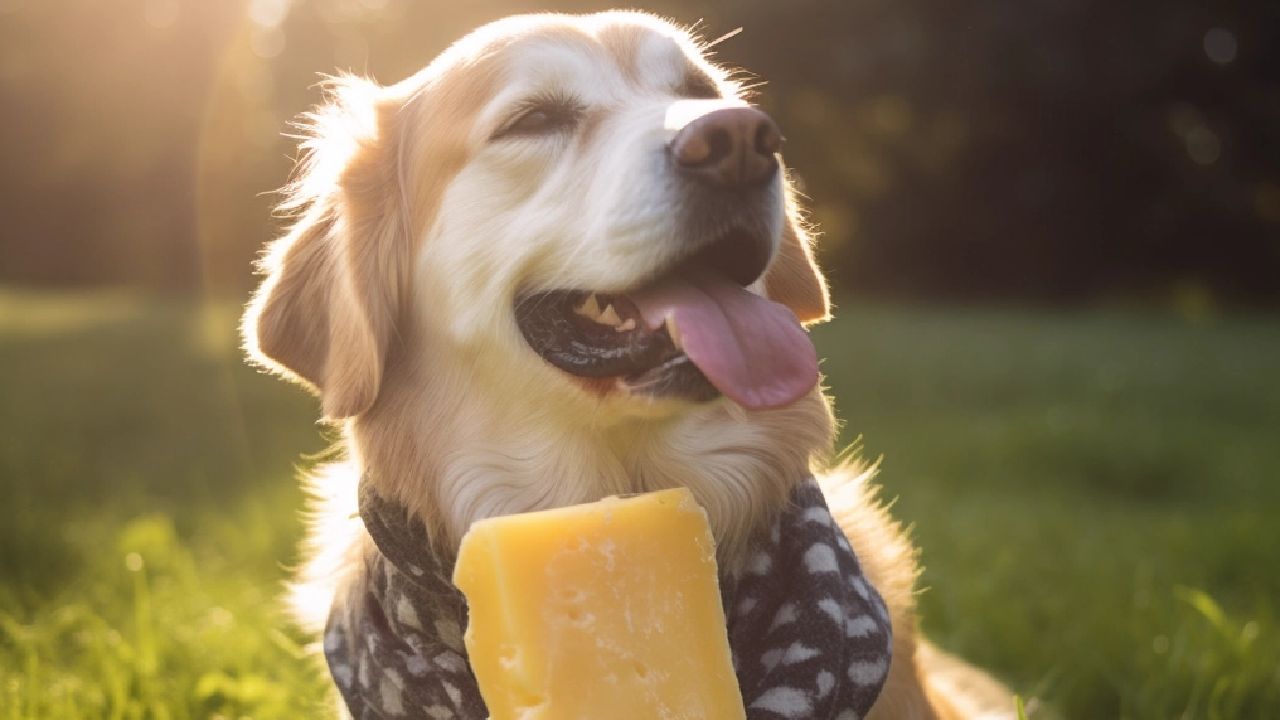When it comes to our beloved canine companions, their diet is a crucial aspect of their overall well-being. Cheese, with its deliciously creamy texture and savory flavor, is a widespread human snack, and it’s not uncommon for our dogs to show an interest in it, too. But can dogs eat cheese, and should they?
In short, yes, dogs can enjoy cheese, but it should be offered in moderation and with consideration of their individual dietary needs and potential lactose intolerance. While cheese can provide some nutritional benefits to dogs, it also comes with certain caveats that pet owners should be aware of.
Is Cheese Bad for Dogs?
The cheese itself is not inherently bad for dogs, but there are essential factors to consider when sharing this dairy treat with your furry friend. One of the critical concerns is the high-fat content in certain cheeses.
While cheese can be a source of protein and essential nutrients like calcium and phosphorus, excessive consumption of high-fat cheese can lead to health issues in dogs, such as obesity and pancreatitis.
Cheese should be given cautiously due to its high-fat content and the potential for lactose intolerance.

Consult your vet before adding cheese to your dog’s diet, and do so in moderation to promote their overall health and well-being.
Effect of Dairy Products on Dogs
Dairy products, including cheese, can affect dogs differently. Some dogs tolerate small amounts, while others may have digestive issues due to lactose intolerance caused by insufficient lactase enzyme. This intolerance varies among dogs; some may handle dairy better than others.
High-fat dairy can lead to weight gain and even pancreatitis. Consider lower-lactose or lower-fat dairy options based on your dog’s tolerance. Monitor their reactions and consult your vet for guidance on dairy in their diet.
Cheese Varieties that Are Good for Dogs
- Cottage Cheese
- Cheddar Cheese
- Mozzarella
- Swiss Cheese
- Parmesan Cheese
- Provolone Cheese
Cheese Varieties that Are Bad for Dogs
- Blue Cheese
- Processed Cheese Spreads
- Feta Cheese
- Cheeses with Added Spices and Herbs
- High-Fat Cheeses
- Aged Cheeses
Benefits of Cheese
Beyond being a delectable delight for humans, cheese can also offer our canine companions a range of health benefits. Here are some of the critical advantages of incorporating cheese into your dog’s diet:
- Nutrient Richness: Cheese provides essential protein, calcium for strong bones and teeth, and vitamin B12 for nerve function and red blood cell production.
- High-Value Training Treats: Its taste and texture make cheese an excellent training reward due to its strong aroma and flavor.
- Medication Administration: Wrapping pills in cheese can make medication easier for dogs to take.
- Caloric Control: Cheese can be portioned easily, which helps maintain portion control in your dog’s diet.
- Diet Variety: Introducing cheese diversifies your dog’s diet, ensuring they receive a wide range of nutrients.
- Digestive Health: Certain cheese varieties contain probiotics that promote a healthy dog gut, aiding digestion and nutrient absorption.

Feeding Cheese Safely to Your Dog
When it comes to treating your dog to some cheesy goodness, safety is paramount. While cheese can provide various benefits, it’s crucial to approach its inclusion in your dog’s diet with care. Here’s how to feed cheese to your dog safely and responsibly:
- Moderation is Key: While cheese can be a tasty treat, it’s important not to overindulge your dog. Cheese is calorie-dense and can contribute to weight gain if given in excess. Generally, treats should make up at most 10% of your dog’s daily caloric intake.
- Consider Lactose Intolerance: Dogs, like some humans, can be lactose intolerant. Lactose is the sugar present in milk and dairy products. If your dog experiences digestive upset, such as diarrhea or gas, they might be lactose intolerant after consuming cheese. Start with small amounts and monitor their reaction before offering larger quantities.
- Choose Natural Cheese: Opt for natural cheese without additives like spices, herbs, or excessive salt. These additives can be harmful to your dog’s health. Stick to plain cheese varieties to avoid any potential adverse effects.
- Portion Control: Break cheese into bite-sized pieces appropriate for your dog’s size. This helps prevent choking hazards and allows you to control the amount of cheese you’re consuming quickly.
- Low-Fat Options: If you’re concerned about the fat content of cheese, consider selecting low-fat varieties. High-fat cheeses can contribute to obesity and pancreatitis in dogs, so choosing options with lower fat content is wise.
- Introduce Slowly: If you introduce cheese to your dog’s diet for the first time, do so gradually. Start with a small piece and observe their response. If they tolerate it well, you can gradually increase the portion size.
- Balance with Regular Diet: Cheese should complement your dog’s diet, not replace it. Ensure their main meals provide the necessary nutrients for their needs and life stage.
Conclusion
Cheese can be a delightful and nutritious addition to your dog’s diet in moderation and with care. Choose the suitable cheese varieties, consider your dog’s tolerance, and consult your veterinarian if you have concerns. Following these guidelines, you can share a cheesy moment with your four-legged friend while ensuring their well-being.

FAQs
Can Dogs Eat Mac and Cheese?
It’s generally best to avoid giving your dog mac and cheese. While plain, small amounts of cooked pasta might be okay as an occasional treat, the cheese sauce in mac and cheese can be problematic.
Is low-fat cheese a better option for dogs?
Yes, low-fat cheese varieties can help prevent excessive calorie intake and reduce the risk of obesity or pancreatitis.
Can cheese be given to puppies?
Puppies have sensitive digestive systems, so avoiding cheese or introducing it sparingly is advisable. Consult your vet before offering cheese to puppies.
Are there any alternatives to cheese for dog treats?
Various dog-friendly treats are available, such as small pieces of cooked meat, vegetables like carrots, or commercial dog treats designed for training.
What should I do if my dog accidentally consumes toxic cheese?
Contact your veterinarian immediately if you suspect your dog has ingested toxic cheese. They can provide guidance based on your dog’s symptoms and the type of cheese consumed.






I had no idea that cheese could be used as a way to give dogs their medication! My dog, Daisy, hates taking pills, so I’ll definitely try wrapping them in cheese next time. Such a helpful tip, thanks!